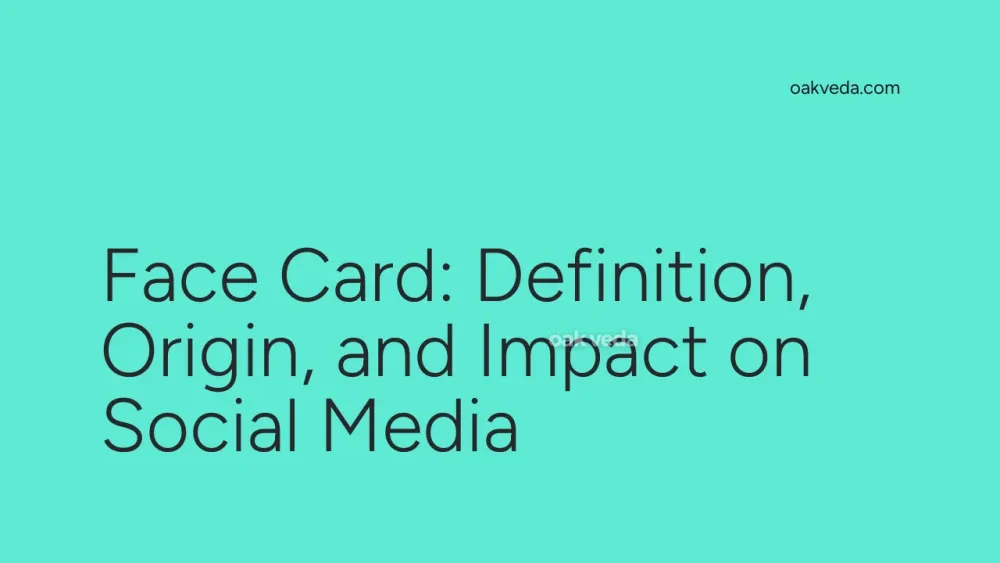
What is Face Card?
"Face card" is a popular social media slang term that has gained significant traction, particularly on platforms like TikTok and Instagram. The term is used to describe someone who possesses exceptional facial beauty or attractiveness, often to the extent that their looks can be leveraged as a valuable asset, similar to an unlimited credit card.
Origin and Development of Face Card
The term "face card" originated on TikTok, the short-form video platform that has become a breeding ground for new slang and cultural phenomena. While the exact date of its first use is unclear, the term gained widespread popularity in 2020 and 2021, coinciding with the platform's explosive growth during the global pandemic.
The concept behind "face card" draws from the traditional playing card deck, where face cards (Jack, Queen, King) are considered high-value cards. In social media context, having a "face card" implies that one's facial features are of high value in the social currency of beauty and attractiveness.
How Face Card Works
The term "face card" is typically used in complimentary statements or as a form of praise. Users might say something like "Her face card never declines," meaning that the person in question consistently looks beautiful, regardless of circumstances. This phrase plays on the idea of a credit card that never gets declined, emphasizing the person's unwavering attractiveness.
Popular Examples of Face Card Usage
Celebrities and influencers are often the subjects of "face card" comments. For instance, fans might say:
- "Rihanna's face card is always valid, even without makeup."
- "Zendaya's face card has unlimited credit."
- "That new selfie? Face card accepted worldwide!"
These statements highlight the perceived flawless beauty of the individuals being discussed.
Impact of Face Card on Social Media Culture
The popularization of "face card" has had several notable effects on social media culture:
-
Beauty Standards: The term has contributed to ongoing discussions about beauty standards in the digital age, sometimes reinforcing unrealistic expectations.
-
Self-Expression: Many users have embraced the term as a way to express self-confidence and celebrate their own beauty.
-
Content Creation: The concept has inspired numerous trends and challenges on platforms like TikTok, where users showcase their "face card" through various filters, makeup techniques, or lighting setups.
-
Language Evolution: "Face card" exemplifies how social media platforms are driving the rapid evolution of language, particularly among younger users.
Controversies Surrounding Face Card
While "face card" is often used positively, it has also sparked debates:
-
Superficiality: Critics argue that the term overemphasizes physical appearance, potentially undermining other valuable qualities.
-
Inclusivity: There are concerns that the concept may exclude individuals who don't fit conventional beauty standards.
-
Mental Health: Some worry about the potential negative impact on self-esteem for those who feel they don't possess a "face card."
How Brands and Influencers Use Face Card
Savvy brands and influencers have incorporated the "face card" concept into their marketing strategies:
-
Beauty Products: Cosmetic companies use the term to promote products that promise to enhance one's "face card."
-
Influencer Collaborations: Brands partner with influencers known for their "face card" to showcase their products.
-
Content Creation: Influencers create tutorials and challenges around the concept, often sponsored by beauty or fashion brands.
Future Trends Related to Face Card
As social media continues to evolve, we can expect the following trends related to "face card":
-
AI and AR Integration: Advanced filters and augmented reality features may allow users to enhance their "face card" in real-time during video calls or live streams.
-
Diversification: The concept may expand to be more inclusive, celebrating a wider range of features and characteristics.
-
Backlash and Countermovement: We might see a pushback against the term, with movements promoting inner beauty or non-appearance-based qualities.
FAQs about Face Card
-
Is "face card" only used for women? While it's more commonly used for women, the term can be applied to anyone regardless of gender.
-
Does having a "face card" mean you're automatically successful on social media? Not necessarily. While attractiveness can be an advantage, successful social media presence requires more than just looks.
-
Can someone improve their "face card"? The term is subjective, but many users attempt to enhance their appearance through skincare, makeup, or photo editing techniques.
-
Is "face card" used on all social media platforms? While it originated on TikTok, the term has spread to other platforms like Instagram and Twitter.
-
Are there any alternatives to "face card"? Yes, terms like "serving looks," "slaying," or "stunner" are sometimes used in similar contexts.
In conclusion, "face card" represents a fascinating example of how social media shapes language and cultural concepts. While it celebrates beauty, it also raises important questions about societal values and the impact of digital culture on self-perception. As with many social media phenomena, its usage and implications continue to evolve, reflecting broader shifts in how we communicate and express ourselves online.
You may be interested in:
- Terms of Service (ToS): Definition, Origin, and Impact
- Referral Traffic: Definition, Origin, and Impact
- Fam: Definition, Origin, and Impact on Social Media
- Shook: Definition, Origin, and Impact on Social Media
- Marketing Proposal: Definition, Origin, and Impact
- Deinfluencing: Definition, Origin, and Impact on Social Media

